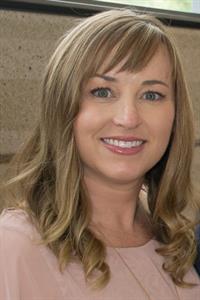Investigator Spotlight
5 Questions for Researchers

Laura Scherer, PhD
Assistant Professor, University of Colorado School of Medicine
Data Science to Patient Value (D2V) | Colorado Program for Patient Centered Decisions at ACCORDS | Division of Cardiology | VA Denver Center of Innovation (COIN)
Dr. Laura Scherer is a social psychologist with content expertise in risk communication, shared decision making, and decision heuristics and biases. Her research focuses on improving shared decision making and health communication in the context of cancer and cardiovascular disease. Her work is funded by the Agency for Healthcare Research and Quality, the National Cancer Institute, and the U.S. Department of Veterans Affairs.
1. Why is your area of science important?
I am a social psychologist who works in health and science communication, and shared decision making. My work focuses on communicating evidence to patients so they can make informed decisions. There are two aspects of this focus, the first is communicating in a way that patients can understand, which means engaging in effective risk communication for diverse populations. The second is communicating in a way that patients will accept, which involves fostering trust and overcoming common decisional heuristics and biases. People often find it difficult to accept evidence that goes against their preexisting beliefs, or that goes against what they want to believe is true. One result is that some people reject evidence-based information as untrue, and become susceptible to health misinformation. This work is important because when people make health decisions that are insensitive to scientific evidence and embrace misinformation, this can result in poor health outcomes, overutilization of low-value care and underutilization of high-value care. Also, achieving the goals of patient-centered care depends on effective communication, and my work seeks to make this easier for both clinicians and patients.
2. What was important in your Health Services Research training?
My training was quite different from most health services researchers. I have a PhD in social psychology, and my training was in basic psychology and heavy in quantitative methods, survey research and experimental designs. About a year before I received my PhD, I became interested in how the sorts of psychological phenomena that I was studying might contribute to difficult problems in medicine. Specifically, I was interested in understanding and addressing negative reactions to new guidelines for breast and prostate cancer screening (guidelines which indicated that taking a less aggressive approach might result in better health outcomes for some populations). As a result of this interest, I moved with my family to Ann Arbor for a postdoctoral fellowship at University of Michigan’s Center for Bioethics and Social Science in Medicine. Under the mentorship of the brilliant Angela Fagerlin, Brian Zikmund-Fisher and Peter Ubel, I learned how to apply my basic behavioral science background to medical decision making, and I never looked back!
3. What are the major take home messages your current research provides?
It is hard to choose just one message! I think that one major take-home message is that communicating medical evidence to patients and the public is hard for two reasons: 1. Lack of comprehension and 2. lack of acceptance of information that people do understand.
4. What are your goals or areas for future research?
I am beyond thrilled that my interest in communicating about mammography screening was recently funded by the National Cancer Institute, and I am also working on an AHRQ-funded project to teach clinicians how to do more effective shared decision making. In the future I would like to identify new methods for addressing health misinformation and improving patient-centered care and evidence-based communication in the context of both cancer and cardiovascular disease.
5.What is the most important advice you have received from your mentors?
If I could sum up the most important advice that I’ve received from my mentors, it would be something like this: Get regular exercise, make time for family, religiously block off time to write, and collaborate with people who make working fun.

Amy Tyler, MD, MSCS, FAAP
Associate Professor, Department of Pediatrics University of Colorado Anschutz Medical Campus
Director of Quality Improvement, Section of Hospital Medicine, Children’s Hospital Colorado
Amy Tyler, MD, MSCS is a hospitalist and Associate Professor of Pediatrics at the University of Colorado School of Medicine and Children’s Hospital Colorado and the Director of Quality Improvement for the Section of Hospital Medicine. Her work bridges the intersection between quality improvement and implementation research, and she has focused her career on developing effective programs for the implementation of guideline concordant care. Her research focuses on “de-implementation” to identify processes and strategies to stop or reduce over-testing and over-treatment that can be broadly adapted to varied contexts and disease processes to improve care and outcomes.
1. Why is your area of science important?
De-implementation of unnecessary and potentially harmful care is the right thing for patients and for society. Over-testing and over-treatment cost the US healthcare system hundreds of billions of dollars a year, and has measurable negative impacts on patients’ physical, emotional, and financial health making it a significant public health concern. As a hospitalist and researcher, I aspire to provide patient-centered, evidence-based, and cost-conscious care not only to my own patients but to also to advance the science of de-implementation so that all patients receive guideline-concordant, high-quality care. Ultimately, saved healthcare dollars can be redirected towards interventions that make a difference like improving access to preventative care and reducing health disparities.
2. What was important in your Health Services Research training?
My work focuses on the intersection between quality improvement and implementation research. My combined training in both quality improvement and research has afforded me the ability to see problems and solutions through the unique lens of both an improver and a researcher which has been invaluable. Along the way I have benefited from outstanding training opportunities and have been mentored by so many incredible and dedicated individuals!
I initially pursued formal training in quality improvement where I was fortunate to learn from some of the foremost leaders in the field at Cincinnati Children’s Hospital. After years of successfully applying advanced improvement approaches to help close the gap between what we know and what we practice, I decided to pursue health services and implementation science research training with a goal of translating evidence into practice and improving outcomes on a larger scale. I was part of the first cohort of the ACCCORDS Clinical Outcomes Research fellowship (SCORE) mentored by Drs. Allison Kempe and Amanda Dempsey. I then completed additional training through the CCTSI Clinical Faculty Scholars Program and the IMPACT Implementation Science K12. I am currently funded by a K08 Career Development Award from AHRQ where my training goals include community-engaged research, qualitative research methods and the conduct of pragmatic clinical trials.
3. What are the major take home messages your current research provides?
We just completed a multi-site qualitative case study exploring reasons why pediatric healthcare providers continue to use unnecessary tests and treatments in bronchiolitis. Providers and healthcare teams told us they often use non-recommended tests and treatments because they perceive that parents want or expect them or because they believe the tests and treatments will improve parents’ experience with care. Conversely, parents told us they want their children to receive care that is appropriate and evidence-based, and that tests and treatments can be anxiety provoking for them. Our study is a reminder that parents may not perceive more care as better care and has important implications for de-implementation in pediatrics.
4. What are your goals or areas for future research?
The focus of my K08 is the development of a de-implementation roadmap that includes targeted de-implementation strategies to help future teams plan for and successfully de-implement non-recommended tests and treatments in their setting by guiding the selection of appropriate strategies tailored to local influencing factors. Next I will apply for R01 funding for a large-scale, pragmatic, randomized-controlled trial of the de-implementation roadmap so that ineffective and potentially harmful medical practices are reduced.
5. What advice do you have for researchers who want to work in this area?
My advice for those developing a research career:
1. Pick an area you are truly passionate about.
2. Connect with colleagues who will be your cheerleaders--there are many ups and downs in research!
3. Find dedicated mentors who not only understand your research but who are also invested in you and your advancement.